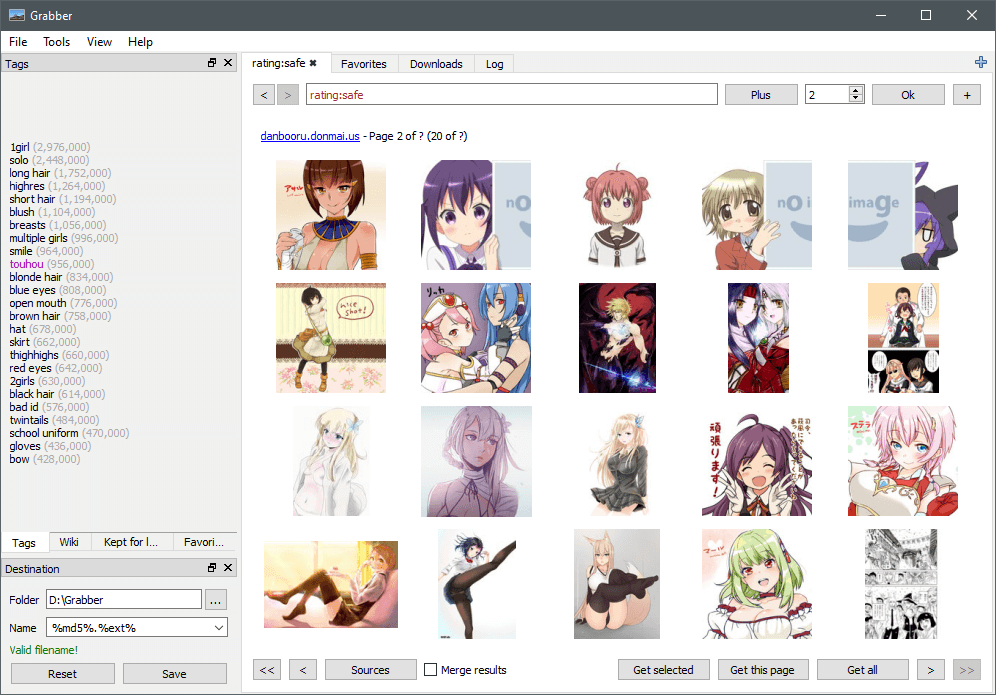Grabber is an imageboard/booru downloader which can download thousands of images from multiple boorus very easily. An imageboard is a type of Internet forum that focuses on the posting of images, often alongside text and discussion. The first imageboards were created in Japan as an extension of the textboard concept. These sites later inspired the creation of a number of English-language imageboards.
Thanks to its powerful naming features, you just have to set your filename and save directory using all the tokens available, and the program will generate a filename using the image’s information. With this, you can store and manage your pictures in advanced directory structures, and save image with custom filenames!
This is free and open source software.
Features include:
- Browse:
- Tabs to make multiple searches at the same time
- Able to show results from multiple imageboards at the same time in a single tab
- Remove duplicate results from multiple-imageboard searches
- Auto-completion of tags in the search field
- Blacklisting of tags to mark or hide images you don’t want to see
- Proxy support
- Post-filtering (when the imageboard search is limited)
- Auto-download images as you search according to a whitelist
- Download:
- Download thousands of images at once
- Download single images using their MD5 or ID
- Command line interface to download images
- Customize
- Add your own imageboards very easily
- Authentication for sources behind a login wall
- Theme support using CSS.
- Lots of options to customize the program’s behaviour
- Organize
- Save images using a custom format.
- Favorite tags to keep track of new images.
- “View it later” tags to save a search for later.
- Support saving images directly to a local booru, such as Szurubooru, MyImouto, Gelbooru, or Shimmie.
- Can add entries to a database for each image or tag while downloading.
- Conditional filenames triggered by a tag.
- Rename already downloaded images.
- Cross-platform support – runs under Linux, macOS, and Windows.
Website: github.com/Bionus/imgbrd-grabber
Support:
Developer: Jack Vasti
License: Apache License 2.0

Grabber is written in C++ and TypeScript. Learn C++ with our recommended free books and free tutorials. Learn TypeScript with our recommended free books and free tutorials.
| Popular series | |
|---|---|
| The largest compilation of the best free and open source software in the universe. Each article is supplied with a legendary ratings chart helping you to make informed decisions. | |
| Hundreds of in-depth reviews offering our unbiased and expert opinion on software. We offer helpful and impartial information. | |
| The Big List of Active Linux Distros is a large compilation of actively developed Linux distributions. | |
| Replace proprietary software with open source alternatives: Google, Microsoft, Apple, Adobe, IBM, Autodesk, Oracle, Atlassian, Corel, Cisco, Intuit, SAS, Progress, Salesforce, and Citrix | |
| Awesome Free Linux Games Tools showcases a series of tools that making gaming on Linux a more pleasurable experience. This is a new series. | |
| Machine Learning explores practical applications of machine learning and deep learning from a Linux perspective. We've written reviews of more than 40 self-hosted apps. All are free and open source. | |
| New to Linux? Read our Linux for Starters series. We start right at the basics and teach you everything you need to know to get started with Linux. | |
| Alternatives to popular CLI tools showcases essential tools that are modern replacements for core Linux utilities. | |
| Essential Linux system tools focuses on small, indispensable utilities, useful for system administrators as well as regular users. | |
| Linux utilities to maximise your productivity. Small, indispensable tools, useful for anyone running a Linux machine. | |
| Surveys popular streaming services from a Linux perspective: Amazon Music Unlimited, Myuzi, Spotify, Deezer, Tidal. | |
| Saving Money with Linux looks at how you can reduce your energy bills running Linux. | |
| Home computers became commonplace in the 1980s. Emulate home computers including the Commodore 64, Amiga, Atari ST, ZX81, Amstrad CPC, and ZX Spectrum. | |
| Now and Then examines how promising open source software fared over the years. It can be a bumpy ride. | |
| Linux at Home looks at a range of home activities where Linux can play its part, making the most of our time at home, keeping active and engaged. | |
| Linux Candy reveals the lighter side of Linux. Have some fun and escape from the daily drudgery. | |
| Getting Started with Docker helps you master Docker, a set of platform as a service products that delivers software in packages called containers. | |
| Best Free Android Apps. We showcase free Android apps that are definitely worth downloading. There's a strict eligibility criteria for inclusion in this series. | |
| These best free books accelerate your learning of every programming language. Learn a new language today! | |
| These free tutorials offer the perfect tonic to our free programming books series. | |
| Linux Around The World showcases usergroups that are relevant to Linux enthusiasts. Great ways to meet up with fellow enthusiasts. | |
| Stars and Stripes is an occasional series looking at the impact of Linux in the USA. | |

